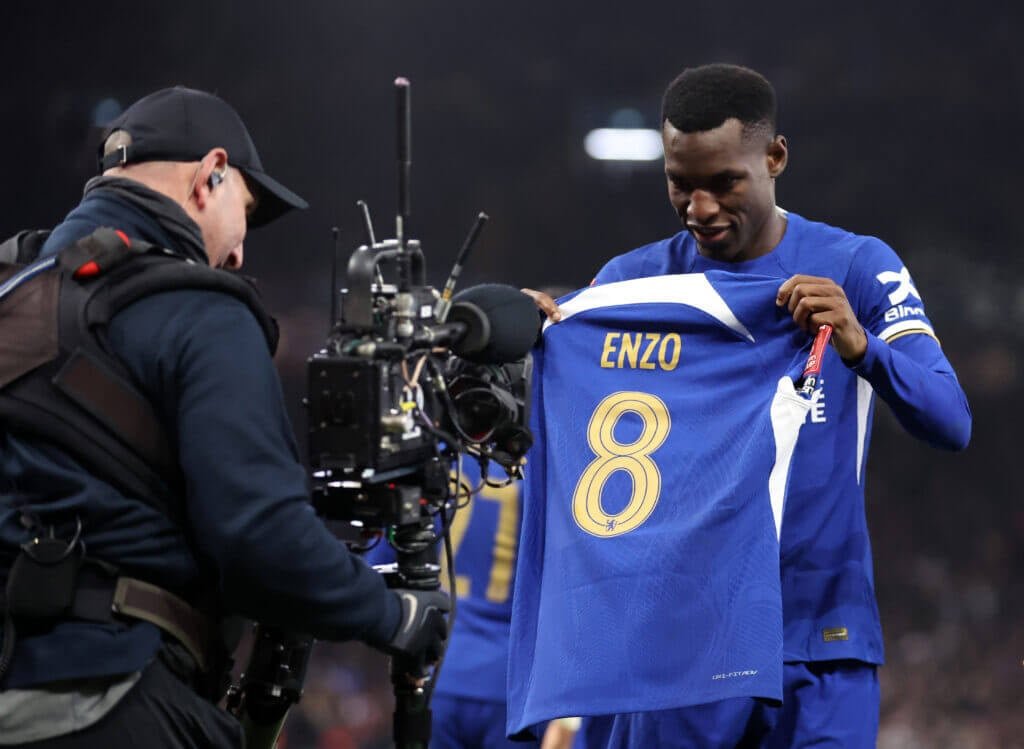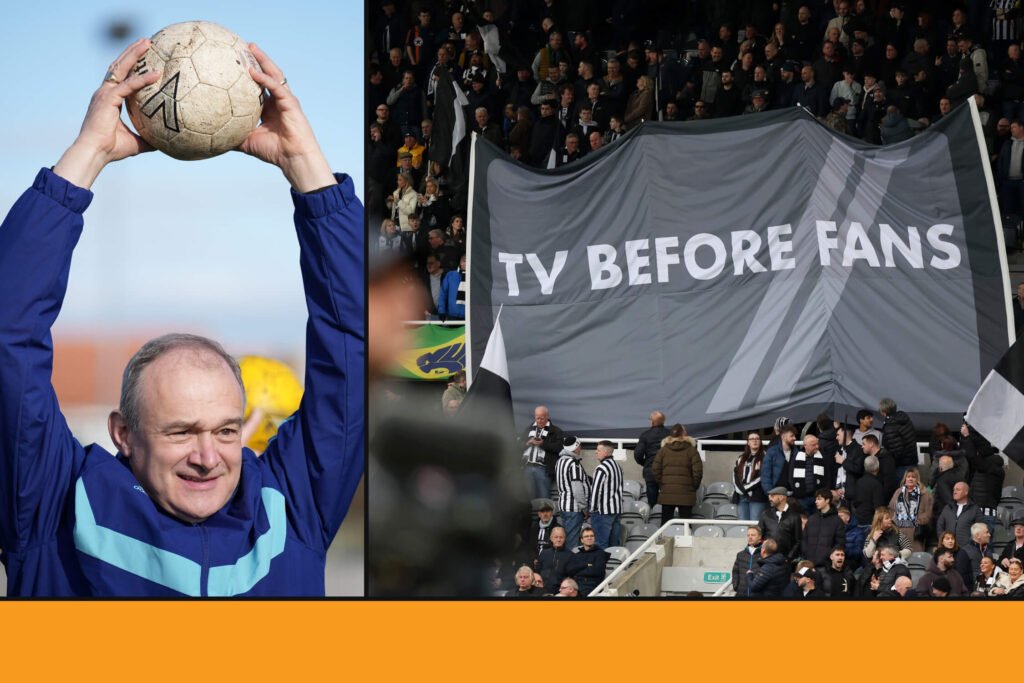For just over 30 years, top-flight football in the UK has been broadcast behind a TV paywall.
Free-to-air broadcasting of top-level games ended in 1992, when the Premier League launched and struck a broadcast deal with Sky Sports, which remains the league’s main live broadcast partner today.
But now, one of the country’s political parties is calling for an end to the exclusive paywall model and for a selection of games to return to free-to-air TV.
The Liberal Democrats (Lib Dems) — one the largest minority parties behind Conservatives and Labour — have launched a policy which it is calling a “free-to-air revolution”.
The policy calls for a law that would mean a range of sporting events currently screened by paid-for channels to be made available free of charge.
Their list includes at least 10 Premier League matches and 10 Scottish Premiership matches each season, the men’s and women’s Six Nations in rugby union, golf’s Ryder Cup and Solheim Cup, and at least one cricket Test match and a One-Day international each summer.
But it is the call for free-to-air Premier League football that will gain the most attention.
The Lib Dems want to make some games free-to-air (Naomi Baker/Getty Images)
“We can’t have our country’s greatest sporting moments hidden away from millions of people behind expensive paywalls,” former Lib Dem leader and current MP Tim Farron tells The Athletic.
“We need to inspire the next generation, and that begins with free-to-air sports. Nobody should be priced out of football.”
What are free-to-air matches?
Simply put, they are games that are available to be watched by anyone with a television and a TV licence, without the need to pay any additional subscription or pay-per-view fee.
These were traditionally available on what used to be known as ‘terrestrial television’, which were channels that could be accessed through a standard TV aerial rather than a cable or satellite dish.
These channels are funded either through advertising or, in the case of the BBC, from the TV licence fee.
In recent times, however, ‘free-to-air’ games have also sometimes been available via free streaming services or online platforms such as YouTube.
In the UK, free-to-air sport has generally been regarded as a way to take sport to the masses. The country has a list of ‘crown jewels’ which are protected legally from being sold exclusively to broadcasters who charge viewers subscription or pay-per-view fees to watch.
The only football currently included among the ‘crown jewels’ in England are the finals of the World Cup and European Championships, and the FA Cup final.
They sit alongside other sporting events including the Wimbledon finals in tennis, the Grand National and The Derby in horse racing, and the Olympic and Paralympic Games.
What games are free to air?
While the ‘crown jewels’ are the only football matches protected by law, the list of free-to-air matches currently extends well beyond those games.
In the men’s game, the whole of the FA Cup is shared between terrestrial broadcasters the BBC and ITV, so games from every round are free to air.
That arrangement will end from the 2025-26 season when subscription broadcaster TNT Sports will begin a four-year deal with the FA.
The FA says ‘selected matches’ will still be available on free-to-air TV but further details have yet to be announced.

FA Cup games are currently free-to-air (Catherine Ivill/Getty Images)
All England internationals are broadcast live by free-to-air Channel 4. Welsh viewers can watch their national team with Welsh commentary on S4C. The Scottish FA Cup is available via the BBC. And, in recent years, the final of the UEFA Champions League has been free to view on BT Sport’s (now TNT Sport) YouTube channel.
In the women’s game, World Cups, European Championships, qualifiers and friendlies have been shown on free-to-air TV. The other home nations have internationals shown on the BBC, who also have rights to the FA Cup.
And, while subscription broadcaster Sky Sports has the rights to much of the Women’s Super League, selected matches can be found on the BBC and the FA Player, a streaming service run by the Football Association.
The Premier League, however, is shared between Sky Sports, TNT and Amazon Prime, all of which require viewers to pay.
Will the Lib Dems get their way?
To put it politely, it is very unlikely. One reason is that the Lib Dems are currently the only major political party calling for this. History and the polls tell us they will not be in a position to implement policy after the next general election.
The election must happen by law by January 2025. Labour, who have spent the last 14 years in opposition, are currently clear leaders in the polls and favourites to form the next UK government.
In UK general elections, every parliamentary seat is up for grabs. A party with an overall majority in the House of Commons forms the government, with that party’s leader becoming Prime Minister.
If no party has an overall majority, the party with the largest number of seats is likely to lead a coalition government.
Even if the Lib Dem proposal is adopted by one of the bigger parties, it would face strong opposition from the Premier League, EFL and potentially MPs.
The Premier League is seen as one of the most high-profile business success stories in the UK, with its business model based largely around the huge TV deals it can strike at home and abroad.
Any move to make some games free-to-air would dilute the value of the product and potentially reduce the size of broadcast deals. This would likely be opposed strongly by Premier League clubs and pro-business MPs.
“I can see why expanding the free-to-air coverage of major sporting events in the future could be beneficial to all parties involved — even for the Premier League itself under certain circumstances,” says Jack Genovese, a sports rights expert and research manager at Ampere Analysis.
“Rights holders generally don’t like being subject to additional regulation that might restrict their ability to sell the rights to their events to whomever they please. This could hurt the value of the broadcasting rights that sports leagues so heavily depend on.
“TV rights typically account for 40 to 60 per cent of the revenues generated by major sports rights holders.”
But the Lib Dems insist the policy could be implemented by changing the ‘crown jewels’ list through Parliament.
They would also seek to amend the Football Governance Bill which the Conservative government introduced in parliament this week.
Farron says the Lib Dems would adjust the crown jewels (Ian Forsyth/Getty Images)
“We want to expand the crown jewels of broadcasting to ensure a selection of Premier League football games are on free-to-air,” says Farron. “This allows private broadcasters to continue their business model, while still allowing the public to see their Premier League team on TV.
“We have our eyes on the upcoming Football Governance Bill to see if we can put an amendment down to get this into law as soon as possible.
“I’m sure the Premier League would listen to government legislation and public opinion. This is a reasonable change and the Premier League will surely respond in a reasonable way.”
Are UK fans clamouring for free-to-air games?
Football in the UK was traditionally considered a working-class sport, but many fans have only briefly experienced free-to-air top-flight games when football was played behind closed doors during the Covid-19 pandemic.
So while most football fans would undoubtedly welcome the prospect of paying less — or not paying at all — for live Premier League matches, it has not been a huge debate among the football public.
Genovese says Ampere’s latest research showed general Premier League fans were usually from lower income brackets than fans who typically attend matches.
He said: “Increasing the availability of live sports on free-to-air services would undoubtedly benefit these fans. It would also possibly contribute to greater participation, as well as to the more frequent occurrence of national moments around sports, which currently tend to be confined to major international events.
“But it would likely come at a cost in terms of reduced TV revenues by the rights holders. The question is whether policymakers consider the events in question to be enough in the public interest to warrant legislative intervention.
“The Lib Dems appear to consider that the events they have selected do; others might argue that there is no intrinsic public interest in the free-to-air broadcasting of these events and that requiring some Premier League or EFL games to be shown free-to-air would be akin to requiring that episodes of Game of Thrones were shown on the BBC or that Oppenheimer was screened in public squares.”
Genovese adds that there were signs that the value of Premier League rights had stopped increasing, despite extra live games being added to the most recent broadcast packages.
“Experimenting with exclusive free-to-air games could be an innovative way of engaging with wider audiences, creating appointment viewing opportunities that could offer opportunities for revenue generation through sponsorship and other commercial avenues,” he says.
“What would be important in that regard is that the selection of free-to-air games is of high enough interest.
“Take La Liga in Spain, for instance, where by law one game per gameweek needs to be made available on a free-to-air basis.
“How the games are selected and allocated, however, means that those free-to-air games very rarely involve the likes of Real Madrid, Barcelona or Atletico, which is why the overall value of the free-to-air rights accounts for 0.2 per cent of the total domestic rights deal in Spain.”
What is the state of play in the United States?
The culture in the U.S. is very different. A large number of the games in the country’s four main traditional sports are available to fans free-to-air.
The majority of American football in the NFL is free-to-air, although Thursday night games are streamed behind a paywall on Amazon Prime and Monday Night Football is on paid-for ESPN with some games simulcast free on ABC.
Basketball in the NBA is more geared towards a paywall model with most games screened on cable television. At least one game per week in the regular season is free on ABC, as are the finals.
It is a similar position in the National Hockey League, though its finals are broadcast in alternate years behind a paywall on cable channel TNT.
And Major League Baseball is largely on cable television behind a paywall, mainly broadcast by region. Still, one game each week and the end-of-season World Series are free-to-air on Fox.
Soccer, both from the nation’s own MLS and the major European leagues, is shared between free-to-air and paid-for broadcasters.
(Top image — Liberal Democrat leader Ed Davey with a football (left), fans protesting TV scheduling at a Premier League game: Getty Images)
Read the full article here

